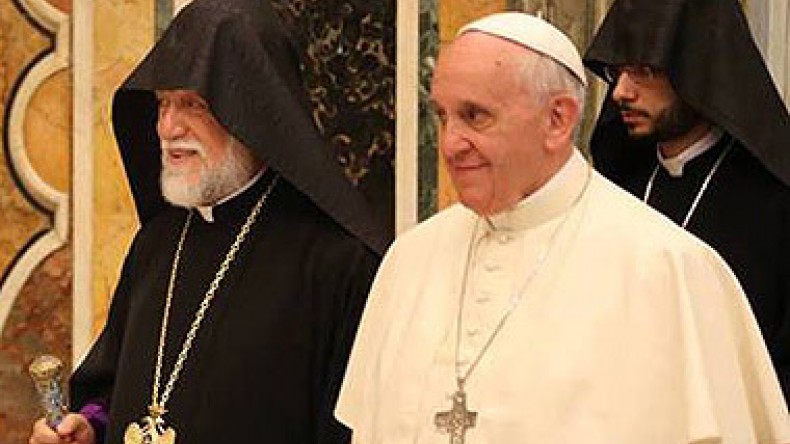
Pope Francis: History of emigration, persecutions and martyrdom has inflicted deeps wounds on hearts of all Armenians
His Holiness Pope Francis and His Holiness Aram I have met in the Vatican, according to the Facebook page of the Catholicosate of the Great House of Cilicia.
Following a private meeting between the two Pontiffs, Pope Francis I met with Catholicos Aram I and the delegation accompanying him. In his speech, the Catholicos noted that since 1997 he has had the opportunity to meet Popes John Paul II, Benedict XVI, and currently, His Holiness Francis I.
Catholicos Aram I then spoke of the special relations between the Roman Catholic Church and the Catholicosate of Cilicia both during the time of the Kingdom of Cilicia and after the Genocide when it settled in Antelias, Lebanon.
The Catholicos then expressed his appreciation of the Pope’s effort to take the church to the people, which he said is also at the heart of the Armenian Orthodox Church and to which it is fully committed. He then invited all churches to leave confessional differences aside and face together the urgent challenges confronting humanity.
Speaking of the Middle East Aram I said that despite the current violence in the region, Christians would continue to witness for their faith, fulfill their duties and demand their rights as citizens of their countries.
Addressing the 2015 Centenary of the Armenian Genocide, the Catholicos thanked the Pope for his past positions towards the Armenian cause and spoke of the one-and-a-half-million Armenians that had lost their lives and of the churches, homes, sources of livelihood, spiritual and cultural heritage that had been lost in the Genocide that had been perpetrated upon the Armenians by the Ottoman Turks. The Catholicos paid tribute to Pope Benedict XVth who denounced the Armenian Genocide in a letter to Sultan Mehmet V in 1915. In his conclusion Catholicos Aram I the asked Pope Francis I to continue advocating for the rights of the Armenian People.
In his response, Pope Francis said that “Commitment to the cause of Christian unity is known to all. You have been especially active in the World Council of Churches and you continue to be most supportive of the Middle East Council Churches, which plays such an important role in assisting the Christian communities of that region as the face numerous difficulties. Nor can I fail to mention the significant contribution which Your Holiness and the representatives of the Catholicosate of Cilicia have made to the Joint Commission for Theological Dialogue between the Catholic Church and the Oriental Orthodox Churches. I am convinced that on our journey towards full communion we share the same hopes and a similar sense of responsibility as we strive to be faithful to the will of the Lord Jesus Christ.”
Referring to the Armenian Genocide, the Pope said that “the Armenian people represent a part of the Christian world that is irrevocably marked by a history of trials and sufferings courageously accepted for the love of God. The Armenian Apostolic Church has had to become a pilgrim people; it has experienced in a singular way what it means to journey towards the Kingdom of God. The history of emigration, persecutions and martyrdom experienced by so many of the faithful has inflicted deeps wounds on the hearts of all Armenians. We must see and venerate these as wounds inflicted on the very body of Christ, and for this very reason a cause for unfailing hope and trust in the provident mercy of the father.”
At the end of formal speeches, the two Pontiffs and the delegation accompanying Catholicos Aram I, coming from Europe, the Middle East, North and South Americas, attended a special service. Following the prayers, the delegates were formally introduced to the Pope.
At the end of the meeting, Catholicos Aram I and the accompanying Armenian clergy were the guests of Pope Francis I for lunch.
Newsfeed
Videos






























